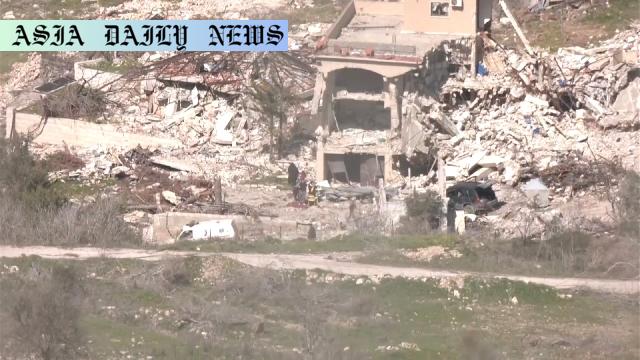Israel-Lebanon: Israeli troops remain in southern Lebanon past deadline, citing Hezbollah non-compliance with the ceasefire agreement.
- Israeli forces remain in southern Lebanon despite ceasefire deadline.
- Hezbollah and Lebanese authorities demand full Israeli troop withdrawal.
- Ongoing tensions include both ground troop presence and airstrikes.
- Israel cites Hezbollah’s non-compliance as justification for staying.

Introduction to the Ceasefire Agreement and Conflict
The recent dispute between Israel and Hezbollah, a Shia Muslim political and militant group in Lebanon, has escalated tensions on an international scale. Despite a ceasefire agreement aimed at stabilizing the region, Israel announced its decision to keep troops stationed in parts of southern Lebanon beyond the established deadline, citing Hezbollah’s failure to adhere to key terms of the agreement. The conflict continues to dominate headlines and fuel global concern.
Provisions of the Ceasefire Agreement
Under the terms of the ceasefire agreement, Israeli troops were expected to withdraw by February 18. This withdrawal was to coincide with the deployment of Lebanese military forces into southern Lebanon, a move aimed at ensuring peace and security in the region. However, Israeli officials claim that Hezbollah has violated the terms of the agreement, prompting the need for Israeli forces to remain in certain strategic locations.
Israeli Justifications for Extended Troop Presence
At a press conference, Israeli Foreign Minister Gideon Saar asserted that the nation’s actions are justified by Hezbollah’s alleged breaches of the ceasefire agreement. He pointed to continued militant activity by the group as the primary reason for stationing troops at five critical locations in southern Lebanon. These military strategies, in Israel’s view, are essential to safeguarding its national interests and preventing further conflict in the region.
Lebanon and Hezbollah’s Response
Lebanese authorities and Hezbollah have strongly condemned Israel’s decision, labeling it as a violation of sovereign territory. A spokesperson for the Lebanese presidential office stated that Israel’s continued presence constitutes an occupation, while Hezbollah leader Naim Qassem reiterated the demand for a complete troop withdrawal. This further cements the chasm between the parties and raises doubts about the ability to uphold the fragile agreement.
Ground Troop Presence vs. Airstrikes
In addition to its ground troop presence, Israel has conducted airstrikes in Lebanon, allegedly targeting Hezbollah positions accused of ceasefire violations. These operations, conducted during the ceasefire period, have intensified criticism from international observers and drawn claims of disproportionate retaliation from Lebanese officials. While Israel maintains the strikes are defensive in nature, they have contributed to escalating tensions in the region.
International Reactions and Implications
The international community has closely monitored these developments, with various countries and organizations urging both parties to uphold the ceasefire terms. The United Nations and allied nations may play a central role in mediating future talks, but ongoing violations and retaliations could undermine these efforts. The situation in southern Lebanon remains a flashpoint with the potential to devolve into a broader regional conflict if not addressed through diplomatic channels.
Conclusion and Path Forward
The dispute over the ceasefire agreement highlights the longstanding tensions between Israel and Hezbollah. While both sides claim the moral high ground, the continued presence of Israeli troops and Hezbollah’s perceived provocations demonstrate the difficulty of achieving lasting peace in the region. Moving forward, international diplomatic engagement and adherence to agreements must be prioritized if the region is to avoid escalating violence. Both sides have a responsibility to place the safety and security of civilians above political and military objectives.



Commentary
Historical Context: A Crossroads for Peace
Israel and Lebanon’s history is deeply intertwined with years of conflict, military interventions, and fragile peace efforts. The current situation, which sees Israel delaying its withdrawal from southern Lebanon, is yet another chapter in this long narrative. For those familiar with the region, events like these underline the difficulty of enforcing and maintaining ceasefire agreements in a climate of distrust and competing security priorities. Such historical precedence serves as a reminder of the need for robust, impartial mechanisms to mediate disputes and monitor compliance.
Hezbollah’s Role in the Ceasefire Breakdown
Hezbollah’s position as both a political entity within Lebanon and a militant group with regional aspirations is a complicating factor in the peace process. By accusing Hezbollah of violating the ceasefire terms, Israel has opened a debate on the group’s dual role and the challenges it poses to Lebanese sovereignty. Nevertheless, such accusations require substantial evidence to avoid being seen as a pretext for maintaining a military foothold in southern Lebanon. It is essential for both sides to engage transparently to rebuild trust and de-escalate tensions.
Broader Implications for Regional Stability
The current impasse is not only a bilateral issue but also a concern for regional stability in the Middle East. Actions taken by either side could provoke broader political or military responses, drawing in neighboring countries and global powers. The use of airstrikes during a supposed ceasefire, for example, illustrates the fragile nature of agreements in the region and the ease with which they can unravel. Stability in southern Lebanon is critical to averting wide-scale conflict and ensuring the safety of civilian populations.
A Call for Renewed Diplomacy
As this complex situation develops, it is clear that renewed diplomacy and international mediation are needed now more than ever. The role of the United Nations and key global players will be pivotal in bringing both parties back to the negotiation table. A solution will require concessions from both sides, an acknowledgment of past failures, and a commitment to prioritize peace over political gain. The people of Lebanon and Israel deserve a more secure future, free from the cycles of violence that have plagued the region for decades.